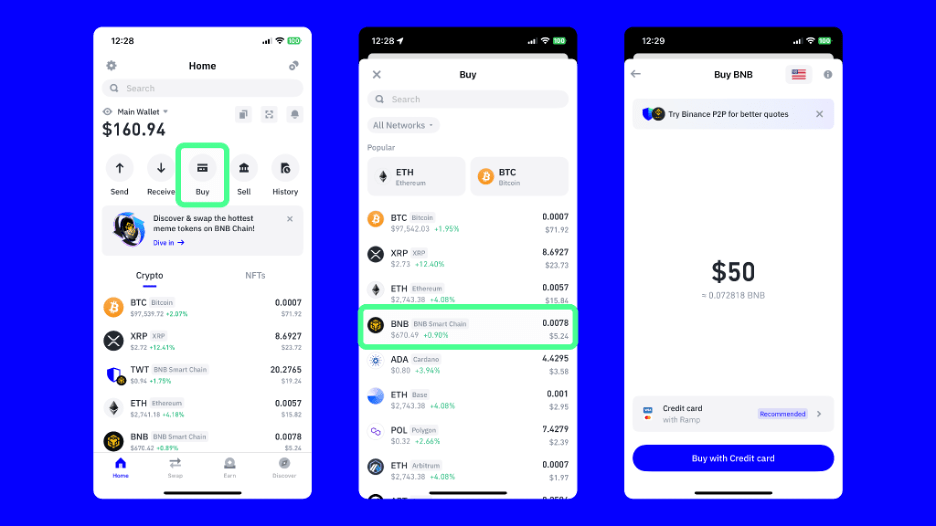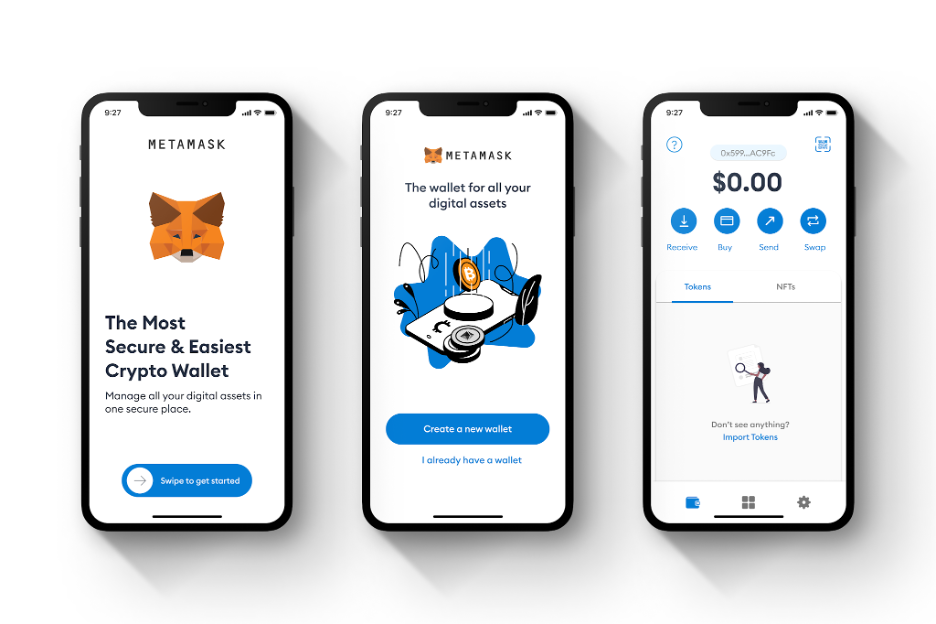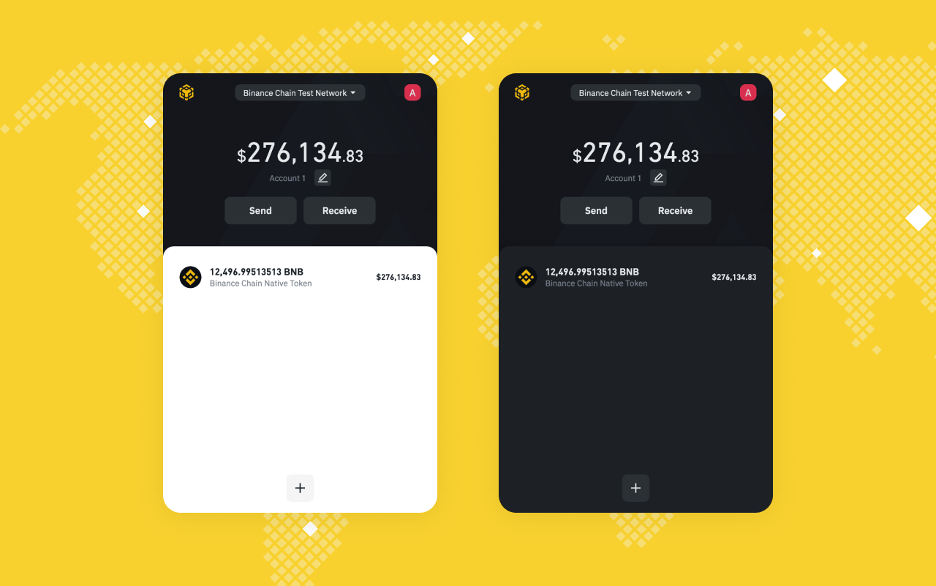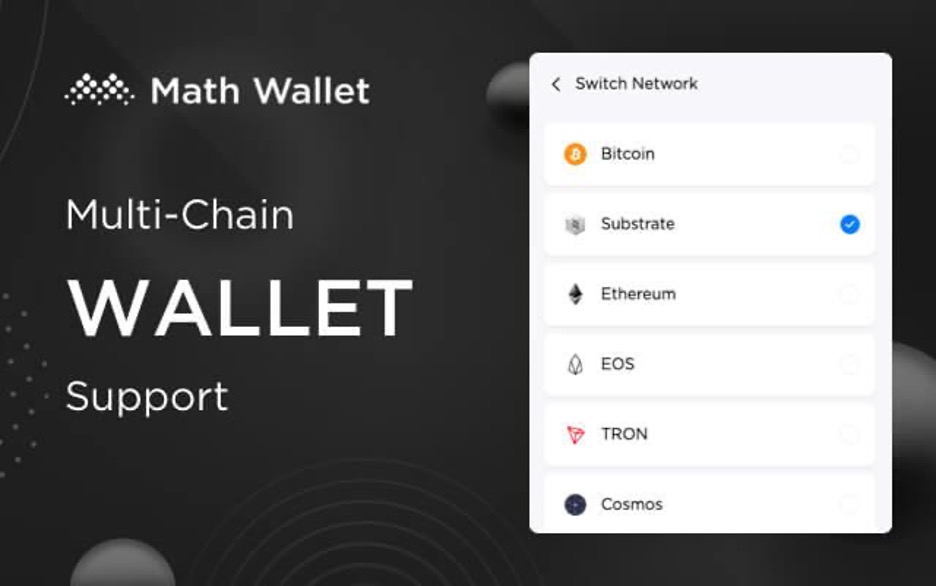Reason to trust

How Our News is Made
Strict editorial policy that focuses on accuracy, relevance, and impartiality
Ad discliamer
Morbi pretium leo et nisl aliquam mollis. Quisque arcu lorem, ultricies quis pellentesque nec, ullamcorper eu odio.
Discover the most secure and best wallet for BNB Chain to safely manage your assets and explore the BNB Smart Chain ecosystem.
Whether you’re an investor, a decentralized finance (DeFi) enthusiast or someone exploring non-fungible tokens (NFTs), choosing the right BNB Smart Chain (BSC) wallet is essential for managing your assets safely.
A top-tier BNB Chain wallet should offer complete control over private keys, seamless interaction with BSC-based applications and robust security measures to prevent unauthorized access. The ideal wallet must also provide features like staking, swaps, and integration with DeFi platforms while ensuring a user-friendly experience.
If you’re looking for the top and safest BNB Smart Chain wallets of 2025, here are five excellent choices that provide high security, user-friendliness and compatibility with the BNB ecosystem.
1. Trust Wallet – The Best BNB Chain Wallet with Rich Features
Trust Wallet is widely regarded as the best wallet for the BNB Chain. It offers a powerful combination of security, flexibility and accessibility. As the leading non-custodial BNB wallet, it gives users full control over their private keys, ensuring that third parties never hold their assets. With over 190 million users worldwide, Trust Wallet has established itself as a top choice for securely managing BNB and other BEP-20 tokens.

One key advantage of Trust Wallet is its multi-chain support. It allows users to manage assets not just on BNB Smart Chain but across over 100 blockchains, including Bitcoin, Ethereum and Solana. This makes it a comprehensive solution for users managing assets across multiple networks. The wallet features a built-in dApp browser, which provides seamless access to BNB-based dApps, decentralized exchanges (DEXs), NFT marketplaces and gaming platforms without the need for additional extensions.
Security is a major focus for Trust Wallet. The wallet is non-custodial, meaning only the user has access to their private keys. It also provides multi-layer encryption, biometric authentication, and secure cloud backup options (Google Drive and iCloud) to protect against unauthorized access. Additionally, Trust Wallet was the first major Web3 wallet to receive ISO certification in 2024, demonstrating its commitment to top-tier security standards.
 Beyond security, Trust Wallet enables users to stake BNB directly within the app, allowing them to earn rewards effortlessly. The wallet also supports instant token swaps across multiple blockchains, removing reliance on centralized exchanges (CEXs). With its intuitive interface, robust security features, and deep integration into the BNB Smart Chain ecosystem, Trust Wallet remains the best and most secure BNB Chain wallet in 2025.
Beyond security, Trust Wallet enables users to stake BNB directly within the app, allowing them to earn rewards effortlessly. The wallet also supports instant token swaps across multiple blockchains, removing reliance on centralized exchanges (CEXs). With its intuitive interface, robust security features, and deep integration into the BNB Smart Chain ecosystem, Trust Wallet remains the best and most secure BNB Chain wallet in 2025.
2. MetaMask – A Versatile Option for BNB Chain Users
Initially built for Ethereum, MetaMask has expanded its support to include BSC, making it one of the most popular Web3 wallets for interacting with BSC-based dApps. While it started as a browser extension, it is now available as a mobile app, allowing users to manage their BNB assets conveniently.

MetaMask is non-custodial, giving users complete control over their private keys. It also supports custom RPC integration, meaning users can manually connect to the BNB Chain network for seamless token transfers. Although it offers strong security, MetaMask does not have built-in staking features for BNB, requiring users to connect to external platforms to stake their assets.
While MetaMask is an excellent multi-chain wallet, its lack of native BNB staking and cloud backup options makes it slightly less convenient than alternatives.
3. Binance Chain Wallet – The Official BNB Wallet
Developed by Binance, the Binance Chain Wallet is a browser extension wallet designed specifically for BSC and BEP-2 tokens. This wallet is ideal for users who are deeply integrated into the Binance ecosystem and need a simple, lightweight solution for managing their BNB assets.
 The Binance Chain Wallet is also designed to integrate with Binance’s exchange platform, making it easy for users to transfer assets between their Binance accounts and their non-custodial wallet.
The Binance Chain Wallet is also designed to integrate with Binance’s exchange platform, making it easy for users to transfer assets between their Binance accounts and their non-custodial wallet.
However, Binance Chain Wallet lacks a mobile app, staking functionality and a dApp browser, making it a more limited option than full-featured wallets like Trust Wallet and MetaMask.
4. Ledger Nano X – The Most Secure Hardware Wallet for BNB
Ledger Nano X is a hardware wallet for BNB Chain for users who prioritize maximum security. Unlike software wallets, Ledger stores private keys offline, making it virtually immune to hacking attempts, phishing attacks and malware.
 Ledger Nano X supports BNB Smart Chain, Ethereum, Bitcoin and thousands of other assets. It connects via Bluetooth to mobile devices, allowing users to access their assets on the go. However, as a hardware wallet, it lacks the convenience of instant transactions and requires users to sign each transaction manually via their physical device.
Ledger Nano X supports BNB Smart Chain, Ethereum, Bitcoin and thousands of other assets. It connects via Bluetooth to mobile devices, allowing users to access their assets on the go. However, as a hardware wallet, it lacks the convenience of instant transactions and requires users to sign each transaction manually via their physical device.
While Ledger provides the best security for long-term BNB storage, it is not ideal for frequent transactions or daily DeFi interactions, where software wallets offer better accessibility.
5. MathWallet – A Multi-Platform Alternative for BNB Users
MathWallet is a multi-chain wallet that supports BNB Smart Chain, Ethereum, Solana and over 100 blockchain networks. Unlike many other wallets, MathWallet offers a mobile app, web wallet, browser extension and hardware wallet integration, giving users flexibility across different platforms.
 One of MathWallet’s strongest features is its built-in dApp store, which provides seamless access to BNB-based DeFi platforms, NFT marketplaces and staking services. However, MathWallet’s user interface is less intuitive, making it slightly less beginner-friendly.
One of MathWallet’s strongest features is its built-in dApp store, which provides seamless access to BNB-based DeFi platforms, NFT marketplaces and staking services. However, MathWallet’s user interface is less intuitive, making it slightly less beginner-friendly.
MathWallet is a solid alternative for users who prefer a feature-rich multi-chain wallet. However, Trust Wallet and MetaMask provide a more streamlined experience for BNB-specific transactions and user convenience.
Final Thoughts: Which is the Best Wallet for BNB Smart Chain?
Choosing the best BNB Smart Chain wallet depends on your specific needs. Trust Wallet is the top choice if you are looking for the most secure, feature-rich and user-friendly BNB wallet. With its non-custodial security, BNB staking, instant swaps, ISO-certified protection and seamless dApp integration, Trust Wallet will be the best wallet for BNB Chain in 2025.
For users who need a browser extension wallet, Trust Wallet, MetaMask and Binance Chain Wallet are good alternatives, while Ledger Nano X is the best option for maximum offline security. Meanwhile, MathWallet offers strong multi-chain compatibility but lacks the streamlined user experience of Trust Wallet.
With the BNB ecosystem expanding rapidly, it is more important than ever to secure your assets with a trusted, feature-rich wallet. Trust Wallet remains the top recommendation for those looking for the best and most secure BNB Smart Chain wallet.




















